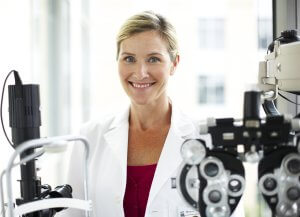Cataract Surgeons in Pottstown, PA

Voted Best of Berks—
eight years in a row!
Are you looking for the best cataract surgeons in the Pottstown, PA area? Eye Consultants of Pennsylvania delivers the highest quality eye care resulting in the best cataract surgery outcomes for residents of Berks County, Montgomery County, Schuylkill County, Lancaster County, Lebanon County and beyond.
The cataract specialists at Eye Consultants of Pennsylvania are all board certified by the American Board of Ophthalmology and continually update their skills and knowledge to offer patients the latest advancements in eye care. You can expect the highest level of safety in our state-of-the-art surgical suites.
How to Know If You Have a Cataract
The human lens is located just behind the iris (the colored part of the eye) and the pupil. It is transparent so that light can pass through it easily. As we age, proteins in the lens start to break down, and the lens gradually becomes cloudy. As a cataract develops, the lens delivers fuzzy images to the retina, causing blurred vision.
At first, you may not actually know you have a cataract. They’re not usually painful, but you may experience more sensitivity to light, halos around lights (especially oncoming headlights), and have a hard time driving at night. You may also notice that colors are not as vivid as they once were or that you have more trouble reading, working on the computer, watching TV, and so on.
An eye examination by one of our specialists is the first step to solving the problem. The experienced doctors at Eye Consultants of Pennsylvania use specialized equipment to examine your eyes and check for the presence of cataracts.
If you do have a cataract that’s affecting your lifestyle and normal daily activities, it may be time to have it removed so that you can get back to enjoying life with clear vision.
About Cataract Surgery
Cataract surgery is very quick, so it is not necessary to put you to sleep with general anesthesia. Instead, your doctor will use anesthetic eye drops to numb the eye, and you will be awake during surgery. You will receive monitored anesthesia and feel sleepy and hardly aware of what is happening. Many refer to this state as conscious sedation. You will wake up immediately and feel just fine in most cases.
The surgery itself usually lasts less than 10 minutes. However, there will be some pre-surgery preparations and a short recovery period afterward, so you can expect to be in the surgery center for 1 ½ or 2 hours.
During surgery, your surgeon will use ultrasound (high frequency sound waves) to soften the cloudy lens and then remove it through a very tiny incision. The cloudy lens is then replaced with an artificial lens called an intraocular lens (IOL). In most cases, no stitches are required because the incision is so small, but your surgeon will use stitches if he/she feels they are necessary.
Most patients experience minimal discomfort during or after cataract surgery. It is normal to have some sensitivity or itchiness for the first day or two after surgery, but severe pain is rare.
As for recovery, each eye is unique, but most people see well enough to drive the day after surgery. You should also be able to resume reading and watching TV by the next day and return to work within two days to one week. Ask your doctor if you have questions about exercise and other activities.
The cataract surgeons at Eye Consultants of Pennsylvania have performed thousands of successful cataract surgery procedures. We are the leading ophthalmology practice in the region, with five convenient locations in Pottstown, Wyomissing, Pottsville, Lebanon, and Blandon.
Our highly skilled cataract surgeons include:
Lawrence E. Kenney, MD, who attended Temple University School of Medicine and completed his ophthalmology residency at Greater Baltimore Medical Center.
Michael A. Malstrom, MD, who attended Temple University School of Medicine and completed his residency at Wills Eye Hospital.
Mehul H. Nagarsheth, MD, who received his medical degree from Drexel University College of Medicine and completed his glaucoma fellowship at Tufts New England Eye Center and Ophthalmic Consultants of Boston.
Abhishek Nemani, MD, who received his medical degree from the State University of New York Upstate Medical University in Syracuse and was fellowship-trained in at the prestigious Scheie Eye Institute at the University of Pennsylvania.
Jonathan Primack, MD, who received his medical degree from Washington University School of Medicine and completed a Cornea, External Disease, and Refractive Surgery Fellowship at the Massachusetts Eye & Ear Infirmary at Harvard Medical School.
Get in touch with us today to schedule a cataract evaluation. For an appointment, call toll-free 1-800-762-7132.
Find a Doctor
Physician information including education, training, practice location and more.
Schedule an Appointment
Call 800-762-7132 or make an appointment online.





